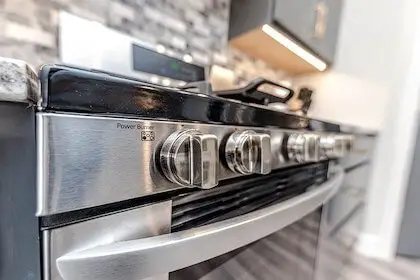Have you ever noticed a strong gas odor when using your oven? Typically, the smell of gas is described as a sharp tangy odor accompanied by a strong burning sensation in your nose and eyes.
When you first switch on your gas oven, a small flame sparks and ignites the gas that is coming naturally from your oven’s burner. The flame becomes very hot and this helps to burn off excess gas.
Since the majority of the gas has already been burned away, most people don’t notice an odor at this time. If the gas smell remains for up to ten minutes after igniting your gas oven, then you might have a gas leak.
You can also smell gas if the oven has been turned on and off multiple times. Each time you ignite your oven, some of the excess gas will be burned away and replaced with fresh air. However, opening and closing your door allows oxygen to flow into the sealed chamber and this causes additional gas to escape through the burner.
Most people don’t notice the smell of gas unless they lean in close to investigate whether there is a gas leak.
Other signs that you might have a gas leak include discolored or damp walls, floors, and ceilings in the vicinity of your oven. If you notice these symptoms, then it’s time to call an expert for help.
Does your oven smells like gas when off?
If you notice a strong smell of gas when off or even while using your oven, you should follow these steps immediately to help prevent any potential dangers.
First, turn off all appliances that are connected to your oven’s gas source.
In some cases, it may just be that your appliances need time for any residual odors to dissipate before being used again. However, sometimes there can still be some gas leftover even after letting appliances sit for a while which can lead to dangerous situations.
If your oven still smells like gas when off, then there might be a gas leak. If that’s the case, you should adhere to the following steps
Step 1
Open all the windows in the room and leave your home or the immediate area and go outside immediately.
Step 2
Call your gas company or the emergency number on your gas bill
Step 3
Do not light a match, turn on electrical switches or use any appliances until they have been checked by a professional for leaks. Gas can leak even if you cannot see, smell or hear it.
Step 4
A professional will first isolate the leak but may not fix it. Once the area has been determined to be safe, you can go back inside and call for a repairs person to attend.
Step 5
If the smell of gas persists after repairs are made, you should contact your local fire department. Do not attempt to re-light your oven until this has been done.
In cases of a severe gas leak, the smell of gas should be reported to your local fire department immediately.
Why does my electric oven smell like gas
A cooking smell in your home is normal; however, if the smell of gas or burned food starts coming from your electric oven, it might be time to investigate or to call an expert.
In some instances, an electric oven smelling like a gas can be caused by the build-up of grease and oil on the heating element. If left untreated, this can lead to a serious fire hazard.
One way to prevent this from happening is by simply wiping down your oven after each use with soap and water or cleaning it more formally with vinegar and baking soda.
Another option is to replace or clean your heating element periodically (typically once per year). This is something that you can do yourself or have a repair person do.
If you do plan on doing it yourself, then you need to roll up your sleeves and be ready to get your hands dirty. It is a good idea to wear gloves to protect your hands from possible bacteria or potential electric shock from touching the wrong place at the wrong time.
Cleaning your Electric Oven
In order to safely clean your heating element, you should first turn off any appliance connected to it and then unplug it from the power source.
- If you can’t find the socket, make sure you switch off the oven from your home consumer board unit.
- Next, remove the front door panel to allow access to the heating element of your electric oven. Remove the screws that are securing it in place with a screwdriver or an allen key.
- You can also cut any tape holding wires in place using wire cutters, being extremely careful not to cut any wires you’re not supposed to.
- On certain models, you may need to remove the back panel of your oven to get access to the heating element
- In this case, remove any screws that are securing it in place and slide out the wire connections for safety.
- Once you have removed the heating element from your oven, use a scraper or steel wool to gently clean off grease build-up on it.
- Make sure you wear protective gloves to avoid contact with grease or oil.
- Once you have finished cleaning, replace the heating element and then replace or secure everything back into place on your oven door.
- Before turning on your oven again, test it first to see if there are any problems. If all works well, then you’re good to go.
If there are no buildups of grease, it might be time to call an electrician if your oven still smells like gas when off.
It’s important to note that the smell of gas should never be ignored. If your oven still emits this odor after self-cleaning it, then you should not attempt to use it and report the problem immediately.
What does a gas leak smell like
A gas leak is something every homeowner should be aware of. The smell of a natural gas leak might not be noticeable to some but it could save your life if you know the signs before it’s too late.
Natural gas has no odor. It is mixed with Mercaptan – a chemical additive that make it easier to detect a leak for safety reasons. However, the effects on humans are dangerous and can lead to death when inhaled in large quantities.
So what does a natural gas leak smell like? Here are 5 common smells of gas that indicate there may be a problem:
- Rotten eggs
- Pungent smelling fumes similar to lighter fluid or propane
- Sulfur (eggy smell)
- Sweet smelling chemical odors like gasoline or kerosene
- Burning rubber smell
Although it might be difficult to find where exactly the source of the smell is coming from, knowing what does a gas leak smells like can help you determine if it’s time to call in some professional assistance.
To ensure that your family is kept safe around gas appliances in your home, always check the pilot lights on gas stoves and ovens before igniting them.
As mentioned earlier, in case of a gas leak, you should open your windows and get out of the house immediately. If you do smell something strange in your home, make sure to turn off all appliances and call an expert right away.




